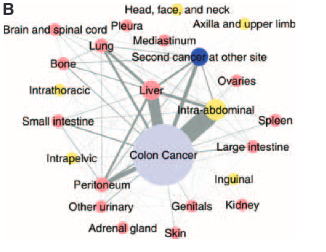
Cancer Metastasis Networks and the Prediction of Progression Patterns
Abstract
Background: Metastasis patterns in cancer vary both spatially and temporally. Network modelling may allow the incorporation of the temporal dimension in the analysis of these patterns.
Methods: We used Medicare claims of 2 265 167 elderly patients aged ⩾65 years to study the large-scale clinical pattern of metastases. We introduce the concept of a cancer metastasis network, in which nodes represent the primary cancer site and the sites of subsequent metastases, connected by links that measure the strength of co-occurrence.
Results: These cancer metastasis networks capture both temporal and subtle relational information, the dynamics of which differ between cancer types. Using these networks as entities on which the metastatic disease of individual patients may evolve, we show that they may be used, for certain cancer types, to make retrograde predictions of a primary cancer type given a sequence of metastases, as well as anterograde predictions of future sites of metastasis.
Conclusion: Improvements over traditional techniques show that such a network-based modelling approach may be suitable for studying metastasis patterns.
Citation:
L.L. Chen, N. Blumm, N.A. Christakis, A.L. Barabasi, T.S. Deisboeck, "Cancer Metastasis Networks and the Prediction of Progression Patterns" British Journal of Cancer, 101(5): 749- 758 (August 2009)